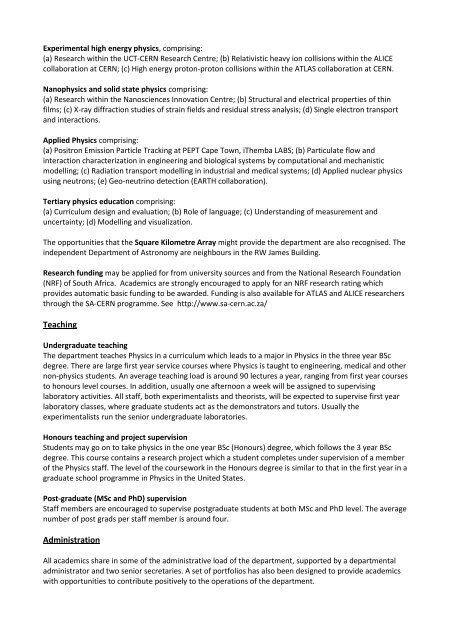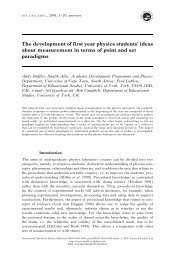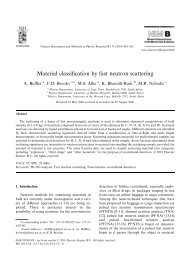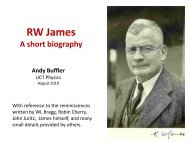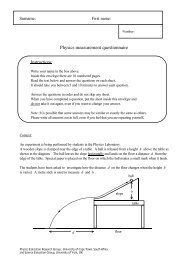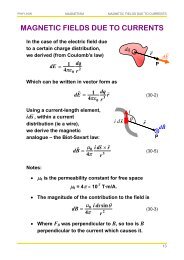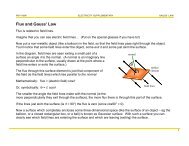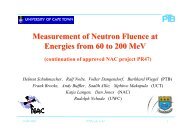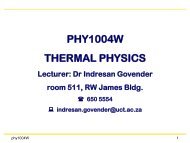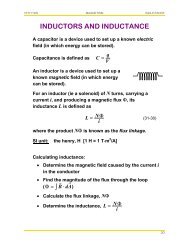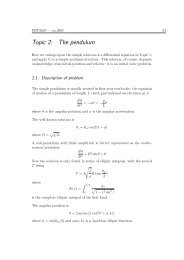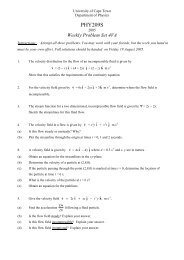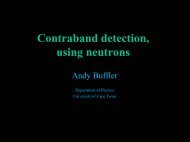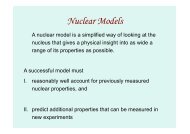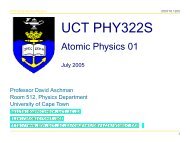Information sheet - University of Cape Town
Information sheet - University of Cape Town
Information sheet - University of Cape Town
Create successful ePaper yourself
Turn your PDF publications into a flip-book with our unique Google optimized e-Paper software.
Experimental high energy physics, comprising:<br />
(a) Research within the UCT-CERN Research Centre; (b) Relativistic heavy ion collisions within the ALICE<br />
collaboration at CERN; (c) High energy proton-proton collisions within the ATLAS collaboration at CERN.<br />
Nanophysics and solid state physics comprising:<br />
(a) Research within the Nanosciences Innovation Centre; (b) Structural and electrical properties <strong>of</strong> thin<br />
films; (c) X-ray diffraction studies <strong>of</strong> strain fields and residual stress analysis; (d) Single electron transport<br />
and interactions.<br />
Applied Physics comprising:<br />
(a) Positron Emission Particle Tracking at PEPT <strong>Cape</strong> <strong>Town</strong>, iThemba LABS; (b) Particulate flow and<br />
interaction characterization in engineering and biological systems by computational and mechanistic<br />
modelling; (c) Radiation transport modelling in industrial and medical systems; (d) Applied nuclear physics<br />
using neutrons; (e) Geo-neutrino detection (EARTH collaboration).<br />
Tertiary physics education comprising:<br />
(a) Curriculum design and evaluation; (b) Role <strong>of</strong> language; (c) Understanding <strong>of</strong> measurement and<br />
uncertainty; (d) Modelling and visualization.<br />
The opportunities that the Square Kilometre Array might provide the department are also recognised. The<br />
independent Department <strong>of</strong> Astronomy are neighbours in the RW James Building.<br />
Research funding may be applied for from university sources and from the National Research Foundation<br />
(NRF) <strong>of</strong> South Africa. Academics are strongly encouraged to apply for an NRF research rating which<br />
provides automatic basic funding to be awarded. Funding is also available for ATLAS and ALICE researchers<br />
through the SA-CERN programme. See http://www.sa-cern.ac.za/<br />
Teaching<br />
Undergraduate teaching<br />
The department teaches Physics in a curriculum which leads to a major in Physics in the three year BSc<br />
degree. There are large first year service courses where Physics is taught to engineering, medical and other<br />
non-physics students. An average teaching load is around 90 lectures a year, ranging from first year courses<br />
to honours level courses. In addition, usually one afternoon a week will be assigned to supervising<br />
laboratory activities. All staff, both experimentalists and theorists, will be expected to supervise first year<br />
laboratory classes, where graduate students act as the demonstrators and tutors. Usually the<br />
experimentalists run the senior undergraduate laboratories.<br />
Honours teaching and project supervision<br />
Students may go on to take physics in the one year BSc (Honours) degree, which follows the 3 year BSc<br />
degree. This course contains a research project which a student completes under supervision <strong>of</strong> a member<br />
<strong>of</strong> the Physics staff. The level <strong>of</strong> the coursework in the Honours degree is similar to that in the first year in a<br />
graduate school programme in Physics in the United States.<br />
Post-graduate (MSc and PhD) supervision<br />
Staff members are encouraged to supervise postgraduate students at both MSc and PhD level. The average<br />
number <strong>of</strong> post grads per staff member is around four.<br />
Administration<br />
All academics share in some <strong>of</strong> the administrative load <strong>of</strong> the department, supported by a departmental<br />
administrator and two senior secretaries. A set <strong>of</strong> portfolios has also been designed to provide academics<br />
with opportunities to contribute positively to the operations <strong>of</strong> the department.


